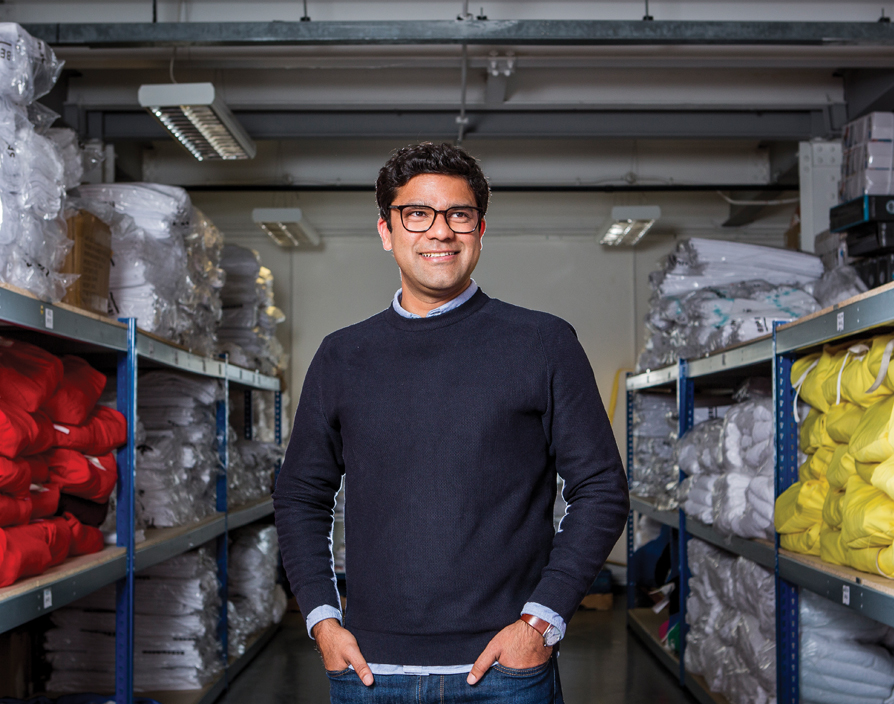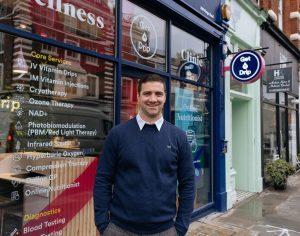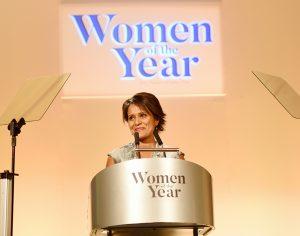By the time Airbnb raised its $112m round in 2011, Nakul Sharma knew that the hospitality market was changing. However, he seemed alone in the industry to notice how big transformations were afoot. “It was on nobody’s radar,” he says. And the San Francisco startup wasn’t alone: around the same time homestay platforms like onefinestay and HomeAway had all raised multi-million pound rounds. For a decade-long veteran in the hotel sector like Sharma, this was enough for him to sit up and take notice. “If you could take the expertise of everything that hotels do in hotel rooms and in their operations to the homestay, that’s a massive opportunity,” he says. “So why was nobody seeing it?” Tired of waiting for his bosses to do anything about it, Sharma co-founded and became CEO of Hostmaker, the technology-driven Airbnb-host-management service.
Ironically, as a teenager he had no intention of spearheading the launch of a tech startup. As a matter of fact, it was quite the opposite. At the beginning of the noughties, his native India was enjoying a digital renaissance where talented students either started software startups in the country or emigrated to try their luck in Silicon Valley. “That was my dad’s dream for me, that I would become an engineer and work for those brands and make lots of money,” Sharma says. “But for me it didn’t click.” For every day his university enrolment drew closer, he felt the panic rise within him. He just couldn’t get excited about it. Fortunately, he picked up a brochure from Shannon College of Hotel Management. Having never even travelled outside of India, entertaining the idea of studying in Europe felt exciting, even exotic. “That was a hard battle with my dad for sure,” he says. “I mean, I’m unsure if he’s still not over it 17 years later.”
But moving to the Emerald Isle meant adjusting to the constant rain and the big emptiness. “Shannon is a really small town,” he says. “There are like 50,000 people there and coming from Bombay with its 15 million, it was just a lot of silence. You couldn’t see people for miles. That was quite a culture shock. Not to mention how much the Irish drink.” Although, the sharp contrast from India was just what excited him and he happily dove into the new culture. Moreover, once he swapped majors in his final year to a marketing degree at National University of Ireland Galway, he couldn’t help but sport a big smile on his face. “I liked that move because it was more commercial and I got a good grip on how a business runs as opposed to just how hotels run,” he says. “And that made it a bit more exciting.”
Having completed his studies in Ireland, Sharma joined Starwood Hotels’ graduate management programme in 2005, which led to his first job with the hotel chain in 2007 and also provided a first taste of what life as an entrepreneur could be like when he helped set up two hotels in Dubai. “I lived on the tenth floor and worked on the second and for the first six months I didn’t see sunlight,” he says. Despite the gruelling workload, looking back on the period Sharma thinks it was an important experience as it toughened him up for his future career with Hostmaker. “It gave me a good sense of how to navigate chaos start making sense of it,” he says.
However, by 2010 he believed staying with Starwood would’ve just been more of the same. “I felt it was a good opportunity to take a step back and see what other skills I could develop,” he says. To further sharpen his business chops, he began studying for an MBA at INSEAD, one of the world’s largest business schools. “You generally felt incompetent in the class because everyone was so smart,” he says. “That was a good thing after coming from the experience in Dubai where you were 25 and felt like an expert. I was 25. I couldn’t be an expert at anything. So it was good to go back to class and feel like an idiot.” Importantly, the one-year programme also provided networking opportunities that’d prove vital in his future entrepreneurial endeavours.

Upon completing his studies he joined InterContinental Hotels’ strategy team in 2011, enabling him to be less concerned about the daily running of the business and look more at big macro trends. “You had to get a bird’s eye view of what was happening,” he says. One trend he noticed was how the homestay sector was about to transform the hospitality market forever. This prompted him to co-write a report in 2013 about the impact movers and shakers like Airbnb would have. His conclusion? That InterContinental should buy the scaleup or find a way to enter the nascent market. “But the response was ‘it doesn’t matter because this is just some kid out of San Francisco and it’s not our customers,’” Sharma scoffs. “Total denial.”
While his bosses were less than excited about the opportunity, he wouldn’t let it slip through his fingers and in 2013 he left his job and set out to launch Hostmaker. Although, he didn’t do that before consulting with his wife Deepti. “We discussed it together and decided to take the risk,” he says. They agreed to put £50,000 of their savings into the business and that she’d stay at work to provide a source of income. But one month into the project she called him up from her stressful job at a law firm. She’d had enough and wanted to join in, meaning that they went from double incomes to none within a month. “That was pretty crazy,” he says.
While Deepti happily joined him on his adventure, his dad wasn’t equally thrilled. “He completely panicked,” Sharma remembers. “He said, ‘why don’t you do it on the side and test it out for a few months and then quit?’” But half-arsing it wasn’t an option for Sharma. During his years at InterContinental he and three of his INSEAD friends had attempted to launch a series of hotel investments. However, since only one of them dedicated his full attention to the project it eventually fell through. “So I strongly felt I needed to cut the addiction to a salary,” Sharma says. “Because otherwise every month will be cushy and you’ll get money. You won’t be desperate enough to make important decisions.” Again opting to go against his father’s wishes, he set out to make his own path with his wife by his side.
Their first step was to pilot the concept by renting out their apartment for three weeks in December 2013 via Airbnb while they took a vacation. The test would prove a roaring success. “We actually made more money in those three weeks than we spent on the holiday,” he says. Key to these great results was that the couple had done everything in their power to bring the hotel experience to the people renting the flat. This meant enlisting the help of friends to deliver keys and ensuring housekeeping made the flat look welcoming. Having proven the concept to themselves, the couple quickly moved forward with their project. “We actually ended up moving out of our home and rented a flat 100 metres down the road and turned our home into a test lab,” he says.
After their inaugural test, they began to research how to improve the experience for hosts and guests even more. “We’d get the bookings and we’d go and ask questions to our guests,” Sharma says. This helped unearth how to make their home more appealing for visitors. Equally important was realising what the pressure points were for hosts. For instance, the couple realised that not everyone could take care of dirty sheets, clean the flat or provide hotelier-styled services as well as they could. “That to me was the ‘aha’ moment,” Sharma says. “I realised that the homes will end up segmenting just like hotels because of the product and service quality and if that’s going to happen then there is a need for a hotel-management company for homes.”

Armed with this insight, Sharma set out to ensure Hostmaker would fill that gap. To make sure the startup did, he enlisted the collective cognitive creativity of the three classmates from INSEAD who he had his earlier project with. “We booked an Airbnb home in Hampstead and for 48 hours we thought through the business proposition,” he says. The biggest result of this brainstorming marathon was realising how providing hotel sheets would heighten guests’ experience. “When you go to a hotel you never think about the fact that thousands of people have slept in that bed before,” Sharma says. “What makes the experience great is having a really well-made bed. There’s crispy white linen and that makes you feel that you’re being taken care of, that you’ve escaped into a holiday.” So if Hostmaker could provide that service for both the host and the guest, then profits were bound to soar.
But taking advantage of this insight would prove more challenging than expected when they started calling up hotel-bed-linen suppliers. “All of them were like ‘Airbnb? What’s that?’”Sharma says. “Nobody got it.” Undeterred, he pressed on and eventually found a supplier who would not only help the startup but who was also willing to lie to his own office and say Sharma owned a small B&B. The only problem was that they needed a new place to deliver the linen to because the supplier’s 40-foot truck couldn’t get into the residential area where Sharma’s flat was. “So we had to find our first warehouse around King’s Cross and got our first delivery, which was really exciting,” he says. “And we kicked off from there.”
Recognising the need to provide a completely hotel-like experience, the company’s first full-time employee wasn’t, contrary to many other tech startups, a software engineer but a housekeeper. “And we paid well above living wage because this was the person who’d make or break our business,” he says. “For the first month I think she had the sweetest job ever because we only had three bookings. So she made about £500 an hour.”
But with all these investments, the founders’ initial nest egg was quickly running dry. “Fortunately, we were starting to build momentum,” he says. This helped persuade his three classmates to each invest £10,000 into the startup. But what really helped them raise £350,000 in 2014 was being officially recognised by Airbnb. “They actually invited me to San Francisco to come and speak at their first ever host conference,” Sharma says.
Off the back of this first investment, another INSEAD alum called him up from Italy and asked if Sharma was considering bringing Hostmaker to Rome. “I was still figuring it out in London but told him that ‘if you think there’s an opportunity in Rome then I’m all ears,’” he says. That’s how he ended up not only growing his business to the Eternal City but also expanded his operations to Barcelona.

However, these expansions and the further investments into the technology didn’t come cheap and by the tail-end of 2015 the company was again running low on cash. “I didn’t know what to do,” Sharma says. Luckily, his INSEAD network would again come to his aid, this time by giving him a chance to pitch at its quarterly angel-investor event. “And one of the judges was a venture-fund investor and he really encouraged us and made introductions and the that’s how we got our first introduction to venture investors,” Sharma says. With the backing of this investor the company was able to raise a $2m seed round, which would eventually be followed by two series A rounds in September 2016 and February 2017 of $1m and $5m respectively.
While this money would certainly come in handy to attract more investors in the future, the more immediate benefit was that Hostmaker could finally move its offices out of the couple’s apartment. “People would sit and work on the couch,” he says. Even though this helped them save money, by the time they raised their first VC round the situation had become cumbersome. “There was almost no privacy,” he says. “They’d come in at 8.30am, get their coffee and if they had a question they’d walk straight into our bedroom. I was like ‘come on guys, let’s at least leave this place alone.’” So with the influx of VC capital they quickly started looking for new offices.
And as they did, they began to look for more tech talent to help build the platform. However, given the UK suffers from a systemic STEM skills shortage, filling these roles were far from easy. “Not only is it hard but it’s super-expensive as an early-stage startup to find talent willing to believe in your startup who don’t actually just want to go and make money at Google, Amazon or Facebook,” he says. Unwilling to compromise the quality of their service they began to hire people to work on the platform remotely. “We’ve solved the distance problem by getting our tech team together every couple of months in one of our offices,” he says. “That makes them feel like more of a unit.”
Another challenge is the fact that regulators are increasingly cracking down on the previously unregulated Airbnb market. For instance Airbnb hosts in London are only allowed to rent out their homes for 90 days per year. Surprisingly, Sharma doesn’t necessarily see this as a bad thing. “The fact that there is so much resistance means something big is happening,” he says. “It’s actually affecting the community. It’s affecting the city and that’s why people are caring so much.” Instead of worrying, he believes new legislation can be good for the industry. “I think that people are just trying to make sense of it,” he says. “So in my view, the fact that it’s getting regulated is a positive thing. Because that means that, one, it’s here to stay and, two, that Airbnb is getting its voice heard.”
Maybe it’s this optimism that has seen Hostmaker keep growing over the years. In November 2017 the startup raised a $15m series B round, which is now being used to expand the business exponentially. While having already opened its platform to hosts in Lisbon, Nice, Cannes and Madrid over the past few months, Sharma teases that this might only be the beginning. “We ended 2017 by being in five markets and we will more than double that number this year,” he says. And even more growth may be on the horizon as the founder hints of an upcoming new investment round. “We could possibly be looking at something towards the end of this year,” he winks.
But despite all this success the question remains: has Sharma’s father forgiven him for not becoming an engineer? “I don’t think he’ll ever let go of that,” he laughs. However, that doesn’t mean he’s not positively affected by it. “He doesn’t say it but I think he’s proud of what’s happening,” Sharma concludes.![]()
Share via:


















































